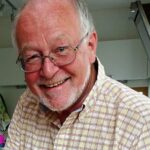“Der Herbst ist des Jahres schōnstes farbiges Lächeln.“ Willy Meurer
Autumn is the most beautiful colourful smile of the year.
Georg Heym (1887 – 1912)
Heym’s dynamic style and imagery are typical of early Expressionism. In this poem the innocence of childhood gives way to a darkening image.
Der Herbst
Viele Drachen stehen in dem Winde,
Tanzend in der weiten Lüfte Reich.
Kinder steh’n im Feld in dünnen Kleidern,
Sommersprossig, und mit Stirnen bleich.
In dem Meer der goldenen Stoppeln segeln Kleine Schiffe,
weiss und leicht erbaut,
Und in Träumen seiner leichten Weite
Sinkt der Himmel wolkenüberblaut.
Weit gerückt in unbewegter Ruhe
Steht der Wald wie eine rote Stadt.
Und des Herbstes golden Flaggen hängen
Von den hōchsten Türmen schwer und matt.
Autumn
Many kites hover in the wind,
Dancing in the realm of far-off currents.
Children in thin clothes
Freckled and pale of brow.
Sailing through the sea of golden stubble
Are small ships, white and lightly built,
And in dreams of its light expanse
The sky sinks blue across the clouds.
Far receded, calm and motionless,
The forest stands like a red city.
And autumn’s golden banners hang
From the highest towers heavy and dull.
Georg Heym had a prophecy about the violent break-up of the world he was born into: Der Krieg (War) was written in 1911.The First World War broke out in 1914.
A Mass for Peace: Peace in a Mess?
On October 26 Karl Jenkins’s L’Homme Armé: A Mass for Peace was performed in the Innsbruck Messe Halle with the Innsbruck University Orchestra under Claudio Büchler. At least five from Inzing attended the performance, along with over a thousand others!
Karl Jenkins wrote L’Homme Armé at the turn of the 21st century as an anti-war piece and dedicated it to the victims of the war in Kosovo. Worldwide, it’s the most frequently performed classical work by a living composer.
In an interview for Freirad’s Poetry Café the conductor Claudio Büchler explains:
“Since the end of the Second World War we find ourselves in Europe in a state of war again. The danger is all too great that we slip into old patterns of behaviour, those that have defined our whole history. We, the University of Innsbruck Orchestra, would like to set a sign for all those who recognize peace. And we can do this by performing this work by Karl Jenkins in Innsbruck. The work should speak for itself, without any political statements. “
Karl Jenkins’s Mass for Peace has an extraordinary variety of poetry and prose, and a wide range of musical styles: it is multi-cultural and universal in its themes. It’s not just a Christian piece, but includes an Arabic Call to Prayers, an extract from the Indian epic, The Mahabharata, and a Japanese poem.
The message of the piece, suggests Claudio Büchler, is perhaps that different beliefs and philosophical views can live in peace together.
Guy Wilson, who commissioned L’Homme Armé: A Mass for Peace in 2000, said:
“What better way, within the framework of a Christian musical and liturgical form, both to look back and reflect as we leave behind the most war-torn and destructive century in human history, and to look ahead with hope and to commit ourselves to a new and more peaceful millennium.”
Sadly, this is a pious hope, in view of Gaza, Lebanon and the Ukraine! Putin and Netanyahu are both war criminals, who need to be dragged to The Hague. The Israeli Government has used up its remaining post-Holocaust credit from the Jewish tragedy.
Peace is in a mess. We need A Mass for Peace more than ever.
Andrew Milne-Skinner

 von
von 


Als Mitglied der Dorfzeitung möchte ich mich ganz klar von folgender Aussage distanzieren: „Die israelische Regierung hat ihr verbleibendes Post-Holocaust-Guthaben aus der jüdischen Tragödie aufgebraucht.“!
Das ist eine untragbar-unsägliche Vermischung!
Dear Andrew,
thank you for the most interesting piece about the concert. However, I cannot let your last sentence stand as it is. I find the idea of a „Holocaust credit“ deeply offensive. It has never been a good idea to balance atrocities as if it was a company report. The real question seems to me: What does it take to form a stable peace? One condition I would see is to give up the aim of anihilating the other side.
Dear Angela, Brigitte and the Dorfzeitung Editors,
My final statement in the review and article ‚A Mass for Peace: Peace in a Mess?‘ distinguishes clearly between the current criminal Israeli Government and the then Jewish tragedy of the Holocaust.
Why do we still fall over backwards to grant ‚credit‘ to Netanjahu and his Government, and – in doing so – passively exonerate them from their war-crimes?
Yours angrily,
Andrew Milne-Skinner
Dear Andrew,
I agree with you on the essence of your statement. The choice of words (in particular “credit”) could be misleading or confusing. But what Netanyahu has been doing in Gaza is – even by UN definition – definitely a war crime. Because of the relevant historical implications and developments, it makes no sense to ask who did what first. Unfortunately, it seems to be no chance of reaching a sustainable agreement of peace at the moment.
Luis
Dear Luis and DZ Readers,
A respected academic at the American University in Beirut (yes, in Lebanon) said 3 weeks ago on BBC News:
„Netanyahu’s strategy is to obliterate Gaza, to annihilate Gaza – pure genocide – to achieve ‚tabula rasa‘, then to bulldoze the debris into the sea, and use the region for Israeli re-settlement.“
In short, let it be said loud and clear: Netanyahu and the complicit Israeli Ministers ARE war-criminals.
Dear Brigitte,
You write: „It has never been a good idea to balance atrocities as if it was (sic, cf. ‚were’….?) a company report.“
The old Biblical adage runs: „An eye for an eye, a tooth for a tooth.“
On October 7 2023, some 1400 Israelis were butchered. Since then, almost 44,000 Palestinians have been slaughtered. Somewhat disproportionate, perhaps?
Is, then, an Israeli life worth some 12 Palestinian lives?
Andrew (Milne-Skinner)